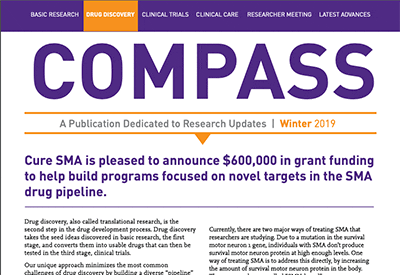
Genentech, a member of the Roche Group, today announced positive data from the pivotal Part 2 of the SUNFISH study evaluating risdiplam in people aged 2-25 years with Type 2 or 3 spinal muscular atrophy (SMA). The study met its primary endpoint of change from baseline in the Motor Function Measure 32 (MFM-32) scale after one year of treatment with risdiplam, compared to placebo. No treatment-related safety findings leading to study withdrawal have been seen in any risdiplam trial to date. Safety for risdiplam was consistent with its known safety profile and no new safety signals were identified.
Risdiplam is an investigational, survival motor neuron-2 (SMN2) splicing modifier, designed to durably increase and sustain SMN protein levels both throughout the central nervous system and peripheral tissues of the body. Roche and Genentech lead the clinical development of risdiplam as part of a collaboration with the SMA Foundation and PTC Therapeutics. Data from the SUNFISH study will be presented at an upcoming medical congress.
Risdiplam is being studied in a broad clinical trial program in SMA, with patients ranging from birth to 60 years old, and includes patients previously treated with SMA-targeting therapies. The clinical trial population represents the broad real-world spectrum of people living with this disease with the aim of ensuring access for all appropriate patients.
About the SUNFISH study
SUNFISH is a two part, double-blind, placebo controlled pivotal study in people aged 2-25 years with Types 2 or 3 SMA. Part 1 (n=51) determined the dose for the confirmatory Part 2. Part 2 (n=180) evaluated motor function using total score of Motor Function Measure 32 (MFM-32) at 12 months. MFM-32 is a validated scale used to evaluate fine and gross motor function in people with neurological disorders, including SMA.
About risdiplam
Risdiplam is an investigational, oral medicine that is systemically distributed and designed to increase SMN protein levels in the central nervous system (CNS) and throughout the body. It is designed to help the SMN2 gene produce more functional SMN protein, to better support motor neurons and muscle function. Roche and Genentech are leading the clinical development of risdiplam in collaboration with the SMA Foundation and PTC Therapeutics. Risdiplam is currently being evaluated in four multicenter trials in people with SMA:
- SUNFISH (NCT02908685) – explained above. Results will be presented at an upcoming medical congress.
- FIREFISH (NCT02913482) – an open-label, two-part pivotal clinical trial in infants with Type 1 SMA. Part 1 was a dose-escalation study in 21 infants. The primary objective of Part 1 was to assess the safety profile of risdiplam in infants and determine the dose for Part 2. Part 2 is a pivotal, single-arm study of risdiplam in 41 infants with Type 1 SMA treated for 24 months, followed by an open-label extension. Enrollment for Part 2 was completed in November 2018. The primary objective of Part 2 is to assess efficacy as measured by the proportion of infants sitting without support after 12 months of treatment, as assessed in the Gross Motor Scale of the Bayley Scales of Infant and Toddler Development – Third Edition (BSID-III) (defined as sitting without support for 5 seconds). Part 2 is ongoing.
- JEWELFISH (NCT03032172) – an open-label exploratory trial in people with SMA aged 6 months–60 years who have been previously treated with SMA-directed therapies. The study is currently recruiting.
- RAINBOWFISH (NCT03779334) – an open-label, single-arm, multicenter study, investigating the efficacy, safety, pharmacokinetics and pharmacodynamics of risdiplam in babies (~n=25), from birth to six weeks of age (at first dose) with genetically diagnosed SMA who are not yet presenting with symptoms. The study is currently recruiting.



